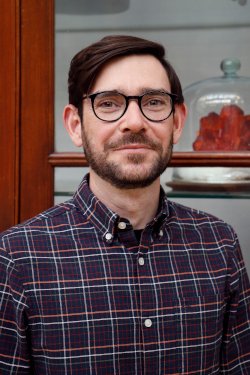Stephen Thomas
2022 United Kingdom Award Finalist — Faculty

Current Position:
Royal Society University Research Fellow and Reader in Chemistry
Institution:
University of Edinburgh
Discipline:
Organic Chemistry

Current Position:
Royal Society University Research Fellow and Reader in Chemistry
Institution:
University of Edinburgh
Discipline:
Organic Chemistry
Recognized for: The use of Earth-abundant metals such as iron and aluminum in the development of new catalysts—chemicals that increase the rate and efficiency of chemical reactions. This approach is more cost-effective and environmentally-friendly than the more commonly-used precious metal catalysts, which are significantly more scarce and toxic by comparison.
Areas of Research Interest and Expertise: Catalysis, Synthetic Methodology, Sustainable Chemistry, Mechanism
Previous Positions:
MChem, University of Wales, Cardiff, UK
PhD, University of Cambridge, UK
Postdoc, University of Basil, Switzerland
Research Officer, University of Bristol, UK
Research Summary: Most industrial-scale chemicals manufactured worldwide require at least one catalytic reaction step during production. Catalytic steps save time and energy in the preparation of pharmaceuticals, petrochemicals, fertilizers, and other consumer goods by increasing the rate of the reaction and often lowering the amount of energy required for a transformation to occur. Unfortunately, many catalytic reactions rely on precious metal elements such as platinum, palladium, and rhodium, which are less abundant in nature than other metals, expensive, and can produce toxic by-products that can harm the environment. Stephen Thomas, PhD, has developed a research program focused on the development of sustainable, Earth-abundant metal catalysts that can perform the same chemical transformations as their precious metal counterparts.
Chemical transformations that utilize metal catalysis have two major hurdles—reactivity and ease of application—that must be overcome in order for the reaction to be viable on a practical scale. One of the reasons that the use of iron and other Earth-abundant metals are not more common is that the most reactive versions of these catalysts are often air- and water-sensitive, making them difficult to handle. Thomas and his group have developed solutions to this problem by discovering reaction conditions in which the metal is activated in situ—within the reaction mixture. These in situ activation methods mean that the high reactivity needed for efficient catalysis can be achieved without needing to overcome the practical limits of handling air- and moisture-sensitive species.
“This is an honor for the group and myself, and a testament to the hard work and ambition of the PhD students and postdocs I work with. We focus on the developing, enabling access to, and understanding sustainable methods for chemical synthesis and manufacture.”
Key Publications:
Other Honors:
| 2021 | Merck, Sharp & Dohme Award, Royal Society of Chemistry |
| 2019 | Teaching Award, School of Chemistry, University of Edinburgh |
| 2018 | Young Investigator Distinction, Royal Society of Chemistry – Brazillian Meeting on Synthesis |
| 2017 | Young Investigator Workshop, EuCheMS |
| 2017 | Green Chemistry Research Award, Pfizer |
| 2016 | Hickinbottom Award, Royal Society of Chemistry |